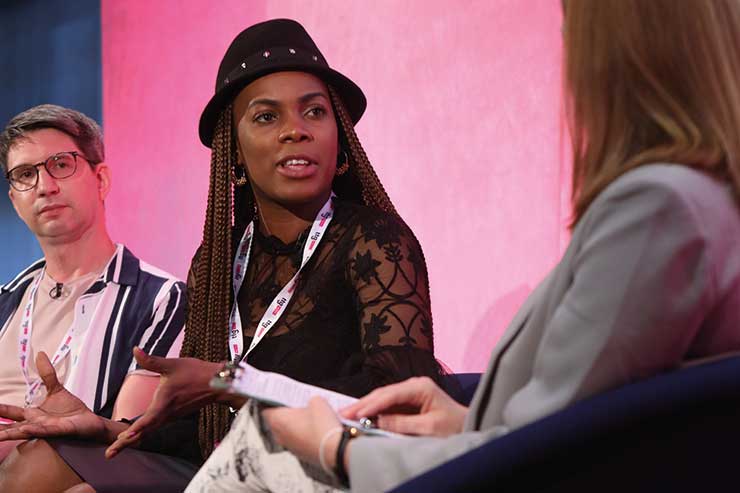8 steps companies can take to create more racial diversity in travel
Business leaders are speaking out about racial inequality and social justice in the wake of the tragic death of George Floyd and the resulting global protests. Increasingly, consumers and employees expect businesses to not only have a point of view or show solidarity but to take tangible and meaningful action towards change.
As one social media post stated: “Thank you for the public statements, now show me a picture of your executive board”.
So, what can the travel industry do to attract, develop and retain talent from diverse backgrounds? It will take more than simply running some unconscious bias training or moving to “blind CVs”, but there are many practical things companies can do to make a difference.
Diversity in travel consultant Martinique Lewis explains the importance of employment in helping achieve racial diversity: "Having representation internally is critical to your business growth externally. Without a diverse team it’s impossible to say diversity and inclusion are top of mind.
"Actionable steps include hiring someone full-time as the designated D&I employee. Can’t afford that? Hire a consultant. When you recruit, recruit from universities that have a diverse population. Attend BAME and diversity panels at the travel shows you attend. Nothing changes if nothing changes – to be a industry leader means to do what’s right, even if it’s not popular."
Set targets and KPIs
Companies need to gather and publish data to establish the current state and track progression. They should also set aspirational targets of what they expect their organisations to look like in five years’ time and measure progress against those targets annually. Companies can encourage employees to disclose their ethnicity by being transparent about what they are trying to achieve and how they are performing.
Appointing an executive sponsor at board level for race will demonstrate visible leadership and commitment as well as drive action and change. Accountability is driven through setting company-wide goals and KPIs. Another visible sign of commitment would be to sign the Race at Work Charter.
Those from BAME backgrounds need to have confidence that they have access to the same opportunities and feel able to speak up if they find themselves subject to direct or indirect discrimination or bias.
Establishing Employee Networks can also be a tangible way to create connections and share and help build an inclusive environment.
Create mentoring programmes
Mentoring and sponsorship have also been seen to consistently deliver results, in particular reverse mentoring like the programme set up by WiHTL for ethnic minorities’ staff across hospitality, travel and leisure, where senior and executive board leaders are mentored by individuals from different ethnic backgrounds in more junior roles.
In many organisations, the processes in place – from the point of recruitment through to progression to the very top – remain favourable to a select group of individuals based upon preconceived notions of what makes a good employee.
This bias can be reinforced by outdated processes and behavioural norms that can and must be improved in order to make any change meaningful.
Below are some key practical actions organisations can take to attract and progress talent from an ethnic minority backgrounds:
- Review all your company’s recruitment and talent management policies and processes for potential bias and lack of transparency. For example, is it clear how people get promoted in your organisation or is it a tap on the shoulder? How transparent are your pay and reward guidelines?
- Have clear criteria of success rather than background for each role in your organisation that informs job descriptions and career ladders. Employers should also consider whether any of the required skills or qualifications that are included for roles are acting as an unnecessary barrier to some groups. For example, focusing on individuals from particular schools or universities can result in a smaller, less diverse pool of individuals to consider.
- Ensure job adverts reflect this and represent your brand authentically. Be plain speaking and do not contain jargon or buzzwords.
- Review where you are advertising your roles – will they reach a wider and more diverse audience?
- Remove certain candidate information until the interview stage. This could include the individual’s name, gender, race, educational establishment and, potentially postcode.
- Have diverse interviewing teams.
- Offer work experience to a more diverse range of candidates.
- Insist on diverse shortlists from recruiters. If your organisation uses recruitment agencies, insist on diverse shortlists at any level or use agencies that have signed up to the Diversity and Inclusion Code of Conduct for executive search and recruitment firms operating in travel.
Beyond having the right policies and processes in place, it is the culture and depth of inclusion of a company that makes the real difference. As Barack Obama said: “In the end, it’s not about finding policies that work; it’s about forging consensus, and fighting cynicism, and finding the will to make change.
Committing to racial justice
Jamie Lee Abtar, executive director, BAME Women in Travel Corporate Partnership, explains how the organisation advocates for racial justice:
"Setting targets and KPIs is what the recently launched BAME Women in Travel Corporate Partnership was created to do. We support leaders in organisations to not only step up but to commit to racial and social justice and equality in their companies.
Our committed partners are guided by BAME Women in Travel to set tangible representation targets, boost the profile of existing employees from minority groups, establish best practice guidelines and set up cross-sector networks and interest groups. Our goal is to drive change and ensure travel businesses attract, recruit, retain and develop BAME talent."

















